Nigeria, with its burgeoning population and expanding economy, offers a vibrant marketplace characterized by high demand for diverse goods.
This makes it a prime location for entrepreneurs seeking to establish a thriving wholesale business.
This comprehensive guide provides a step-by-step roadmap to:
- Launching a successful wholesale venture in Nigeria
- Encompassing crucial aspects such as navigating the wholesale landscape
- Fulfilling legal obligations
- Identifying popular wholesale business models
- Evaluating cost considerations
- Developing sourcing strategies
- Implementing effective marketing techniques.
Sneak Peek Into the Wholesale Business in Nigeria
Wholesale businesses form a critical pillar of the Nigerian economy, serving as the vital link between manufacturers and retailers.
These businesses procure goods in bulk from manufacturers at reduced prices and subsequently distribute them to retailers or other businesses for resale.
This streamlined process ensures the efficient movement of products through the supply chain, thereby contributing significantly to the nation’s economic progress.
In 2011, the wholesale and retail trade sector commanded a substantial 19.4 percent share of Nigeria’s GDP, a notable increase from 16.2 percent in 2007.
The Nigerian wholesale market showcases a diverse array of businesses, ranging from small-scale wholesalers and supermarkets to large-scale distributors.
A significant portion of consumer spending, approximately 74.1 percent, is directed towards essential categories such as food, clothing/footwear, and household goods.
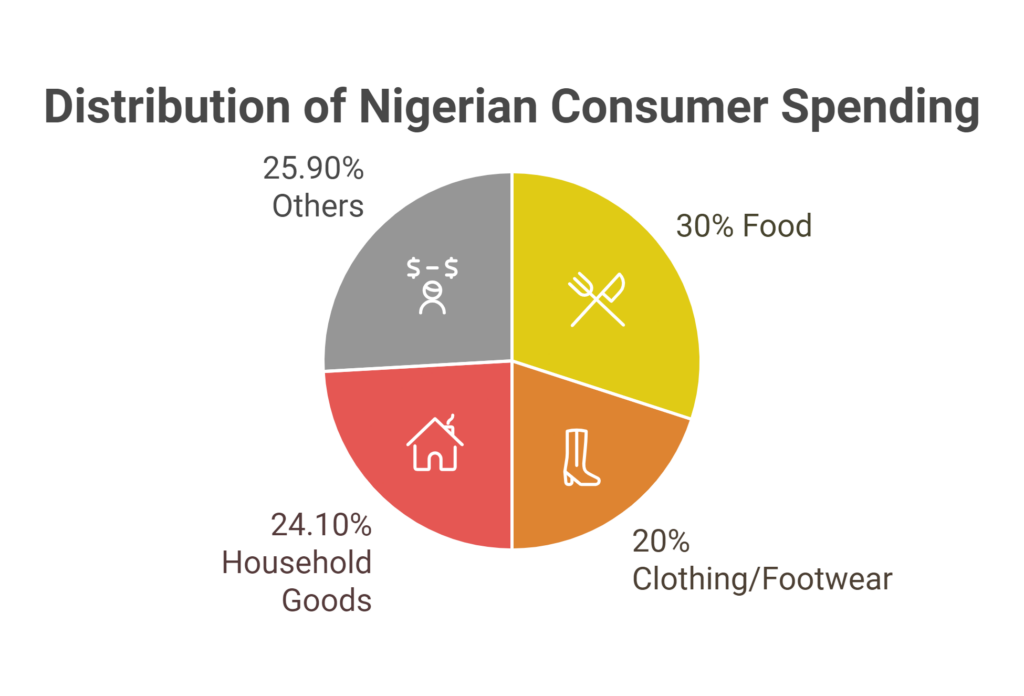
This underscores the substantial demand within these sectors, presenting potentially lucrative opportunities for wholesale businesses.
Several factors propel the dynamism of Nigeria’s wholesale market, including a youthful and expanding population, increasing urbanization, and rising household incomes.
These trends fuel a strong demand for consumer goods, particularly fast-moving consumer goods (FMCG) like food, beverages, and household items, as well as electronics.
Furthermore, there’s a growing preference for convenience and online shopping among Nigerian consumers, influencing distribution and marketing strategies for wholesalers.
Notably, the country’s young and urban population exhibits a rising demand for specific products like mobile phones and personal care items, reflecting the impact of evolving demographics and increased access to information.
Examples of Wholesale Companies in Nigeria
To illustrate the diversity of the wholesale market in Nigeria, here are some examples of companies operating in this sector:
- 478 Limited
- Adam & Eve Luxury Store
- Baxi by MFS Africa
- Elite Innovations Nigeria
- FMCG Distributions Ltd.
Legal Requirements for Starting a Wholesale Business in Nigeria
Establishing a legitimate wholesale business in Nigeria necessitates adherence to specific legal requirements. Below is a comprehensive outline of the essential steps involved:
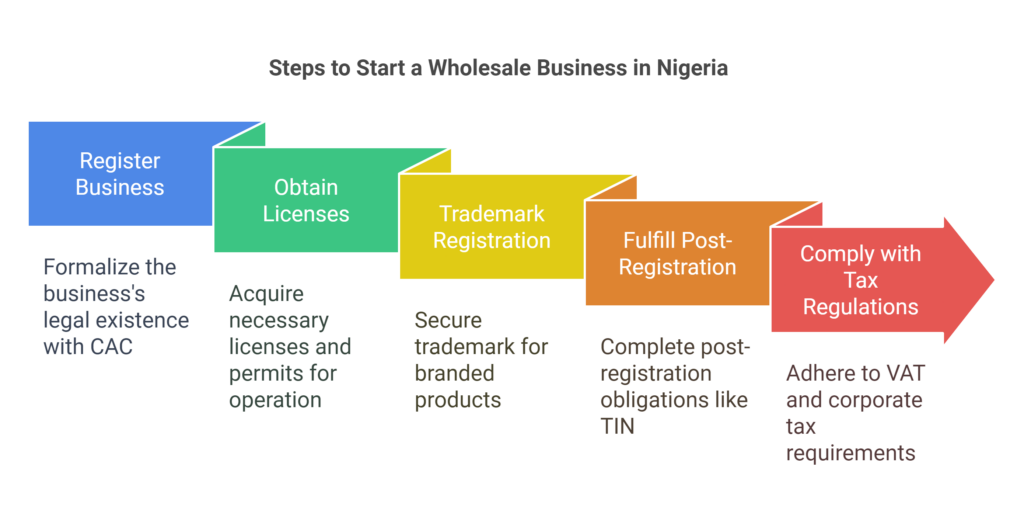
a). Register your business
The initial step to start a wholesale business in Nigeria involves registering your business with the Corporate Affairs Commission (CAC).
This process formalizes your business’s legal existence and assigns a unique identifier, which is crucial for establishing credibility and engaging with manufacturers.
During registration, you’ll need to select a legal structure for your business, with common options including:
- Sole proprietorship
- Partnership
- Limited liability company
b). Obtain necessary licenses and permits
Depending on the specific nature of your wholesale business and the products you intend to sell, you may be required to obtain specific licenses and permits. These could include:
- A general business license
- A sales tax permit, allowing you to purchase goods wholesale without incurring sales tax
- Specialized permits for particular product categories, such as food and beverages
c). Trademark registration
If your wholesale business involves distributing branded products, registering the trademark for the brand in Nigeria is essential.
This serves as a prerequisite for other regulatory approvals, particularly if you deal with products like food, drugs, cosmetics, medical devices, bottled water, or chemicals, which necessitate registration with the National Agency for Food and Drug Administration and Control (NAFDAC).
d). Fulfill post-registration requirements
After registering your business, ensure compliance with post-registration obligations, such as:
- Obtaining a Tax Identification Number (TIN)
- Registering with the Federal Inland Revenue Service (FIRS)
- Opening a business bank account
- Obtaining any other necessary permits
- Paying and filing taxes, including VAT and corporate income tax
- Filing annual returns with the CAC
e). Comply with tax regulations
Familiarize yourself with the tax requirements applicable to wholesale businesses in Nigeria, including Value Added Tax (VAT) and corporate income tax.
Ensure timely fulfillment of your tax obligations to avoid penalties and maintain a strong legal standing.
Freight Forwarding License
If your wholesale business in Nigeria involves importing or exporting goods, you might need to obtain a freight forwarding license.
The requirements for this license include:
- An application letter addressed to the General Manager of either the Eastern or Western Ports
- A Certificate of Company Registration or Certificate of Incorporation from the Corporate Affairs Commission (CAC)
- Memorandum and Articles of Association
- Bank reference
- Three years of Tax Clearance Certificates
- Evidence of registration with the Council for the Regulation of Freight Forwarding in Nigeria (CRFFN)
- A registration fee of ₦200,000.00 payable to the NPA revenue account
Steps to Starting a Distribution Business in Nigeria
For a more comprehensive understanding of the process, here are the detailed steps involved in starting a distribution business in Nigeria:
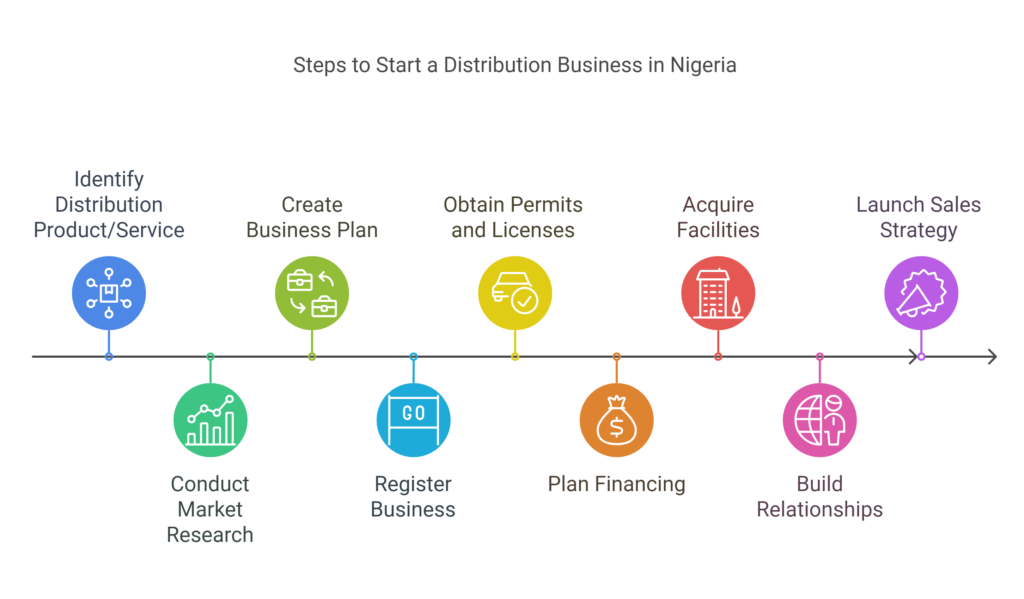
- Identify your distribution product/service: Determine the specific product or service you want to distribute.
- Conduct market research: Analyze the market demand for your chosen product/service.
- Create a business plan: Develop a comprehensive business plan outlining your goals, strategies, and financial projections.
- Register your business: Register your distribution business with the appropriate authorities.
- Obtain necessary permits and licenses: Secure all required permits and licenses to operate legally.
- Plan your financing: Determine your financial needs and secure funding.
- Acquire necessary facilities: Obtain warehouse space, transportation, and other essential facilities.
- Build relationships: Establish strong relationships with retailers and manufacturers.
- Launch your sales strategy: Implement effective marketing and sales strategies to promote your distribution business.
Common Types of Wholesale Businesses in Nigeria
The wholesale sector in Nigeria encompasses a variety of business models, each with its own characteristics and target market. Some of the common types include:
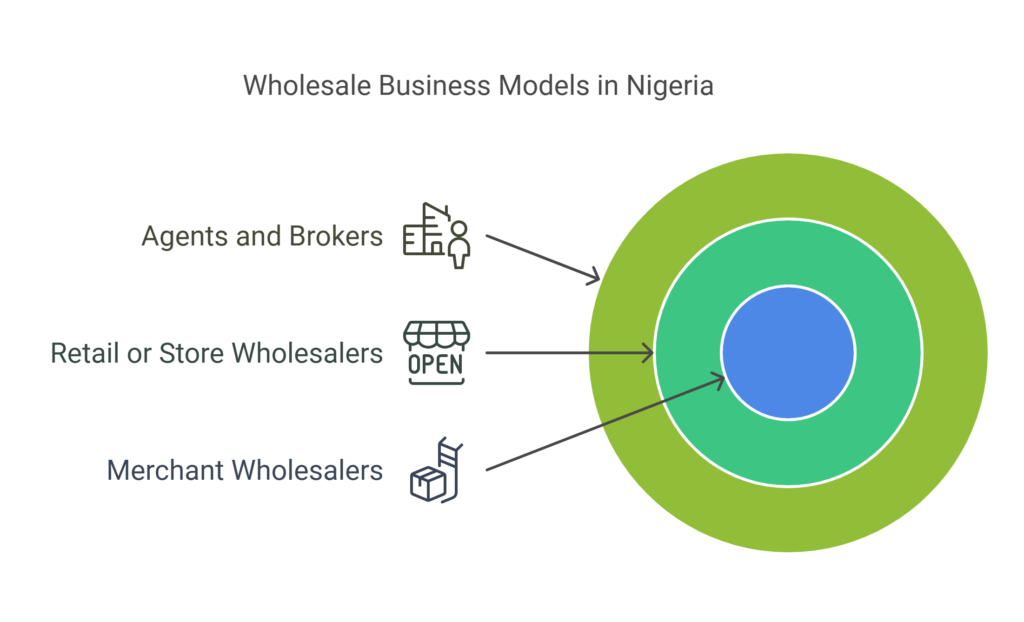
- Merchant Wholesalers: These wholesalers operate by purchasing goods directly from manufacturers in large quantities, storing them in warehouses, and then selling them to retailers, other businesses, or institutional customers. They assume ownership of the products they sell.
- Retail or Store Wholesalers: These wholesalers focus on a specific industry, such as electronics or clothing. They typically sell to retailers or directly to consumers at wholesale prices, effectively bypassing traditional distribution channels.
- Agents and Brokers: These wholesalers act as intermediaries, facilitating transactions between buyers and sellers without taking ownership of the products. They connect manufacturers with retailers and earn a commission on the sales they facilitate.
To maximize profitability in the wholesale business, it’s crucial to negotiate favorable deals with suppliers and effectively manage operating costs.
This strategic approach allows wholesalers to increase their profit margins by optimizing the price difference between their purchase and selling prices.
Franchise Opportunities in Wholesale
The franchise model offers another avenue for entering the wholesale business in Nigeria. Some of the most promising sectors for franchising include:
- Fast food
- Hotel services
- Professional and service training
- Fashion
- Healthcare
- Oil/gas distribution services
- Transportation
- Telecommunications
- Distribution services
Wholesale Business Ideas in Nigeria
The range of products and services suitable for wholesale distribution in Nigeria is extensive. Here are some ideas to consider:
- Agricultural export business
- Poultry farming
- Fish farming
- Snail farming
- Rice farming and processing
Read also: 39+ Best Wholesale Business Ideas in Nigeria with Low Capital
Costs Associated with Starting a Wholesale Business in Nigeria
The financial investment required to launch a wholesale business in Nigeria can vary significantly based on several factors, including the specific industry, the types of products you plan to sell, your chosen business model, and your overall business objectives.
For instance, establishing a wholesale business for electronics in Nigeria will likely entail a larger initial investment compared to starting one for clothing or accessories.
Before venturing into the wholesale business, it’s essential to identify a profitable niche and conduct thorough market analysis.
This involves understanding consumer demand, identifying potential competitors, and evaluating market trends.
Here’s a breakdown of the key cost components to consider:
| Cost Category | Estimated Range (₦) | Notes |
| Inventory | ₦200,000 – ₦5,000,000+ | This is your biggest upfront cost. The amount varies wildly depending on your niche and scale. Foodstuff? Could be millions. Phone accessories? Maybe a few hundred thousand. |
| Storage/Warehouse | ₦50,000 – ₦500,000+ per year | Secure storage is crucial. Factor in rent, utilities, and security. Location matters. Closer to your customers? Higher rent. |
| Transportation | ₦100,000 – ₦10,000,000+ | Need a truck? A van? Maybe just a reliable motorbike? Consider purchase costs, fuel, maintenance, and potentially driver salaries. |
| Licenses and Permits | ₦20,000 – ₦100,000+ | Don’t skip the legal stuff. Business registration, local government permits – these costs vary by location and industry. |
| Marketing and Advertising | ₦10,000 – ₦1,000,000+ | Gotta get the word out. Online ads, flyers, maybe even some radio spots. Your budget depends on your target market and strategy. |
| Staff Salaries | ₦30,000 – ₦500,000+ per month per employee | Need help with sales, deliveries, or warehouse management? Factor in salaries, benefits, and potential training costs. |
| Utilities | ₦10,000 – ₦100,000+ per month | Electricity, water, internet – these costs add up. |
| Miscellaneous Expenses | ₦50,000 – ₦200,000+ | Unexpected costs always pop up. Equipment repairs, legal fees, travel expenses – be prepared. |
It’s crucial to develop a detailed business plan to accurately estimate your startup costs.
Consider exploring cost-effective models like dropshipping, where you don’t have to handle inventory or shipping, to minimize upfront expenses.
While wholesaling can be a profitable business model, it’s important to be aware of potential downsides, such as thin profit margins and the need for a significant upfront investment.
Sourcing Wholesale Goods in Nigeria
Securing reliable suppliers is paramount for maintaining a consistent supply of high-quality products at competitive prices. Here are some avenues for sourcing wholesale goods in Nigeria:
- Online wholesale marketplaces: Platforms like Shopify Collective, Alibaba, AliExpress, DHgate, EK Wholesale, Faire, Wholesale Central, and IndiaMart offer a vast selection of wholesale products from both local and international suppliers.
- Trade shows and networking events: Attending industry-specific trade shows and networking events provides valuable opportunities to connect with potential suppliers and explore new products.
- Industry publications: Online newsletters, blogs, and trade magazines can be valuable resources for identifying wholesale distributors and manufacturers in your chosen industry.
- Wholesale markets: Nigeria boasts numerous wholesale markets where you can source goods directly from wholesalers. Some of the prominent ones include:
- Mile 12 Market (Lagos): Renowned for foodstuffs and farm produce.
- Onyingbo (White Sand) Market (Lagos): Offers a diverse range of goods.
- Alade Market (Lagos): Known for trendy and fashionable items.
- Ogbete Main Market (Enugu): The largest market in Enugu State.
- Kurmi Market (Kano): One of the largest markets in Nigeria.
- Ebeosi: An online wholesale marketplace offering a wide variety of products.
- Warehouse24: Another online platform with a vast selection of wholesale products.
- Wholesale suppliers for small businesses: Consider these suppliers:
- Faire
- DHgate
- IndiaMart
- Zooby
- Shopify Collective
When evaluating potential suppliers, consider factors such as product quality, pricing, reliability, minimum order quantities, and the potential for cooperative growth opportunities.
Building strong relationships with your suppliers is crucial for long-term success in the wholesale business.
Marketing and Selling Wholesale Goods in Nigeria
Effective marketing is the engine that drives sales and expands your customer base. Here are some strategies to consider:
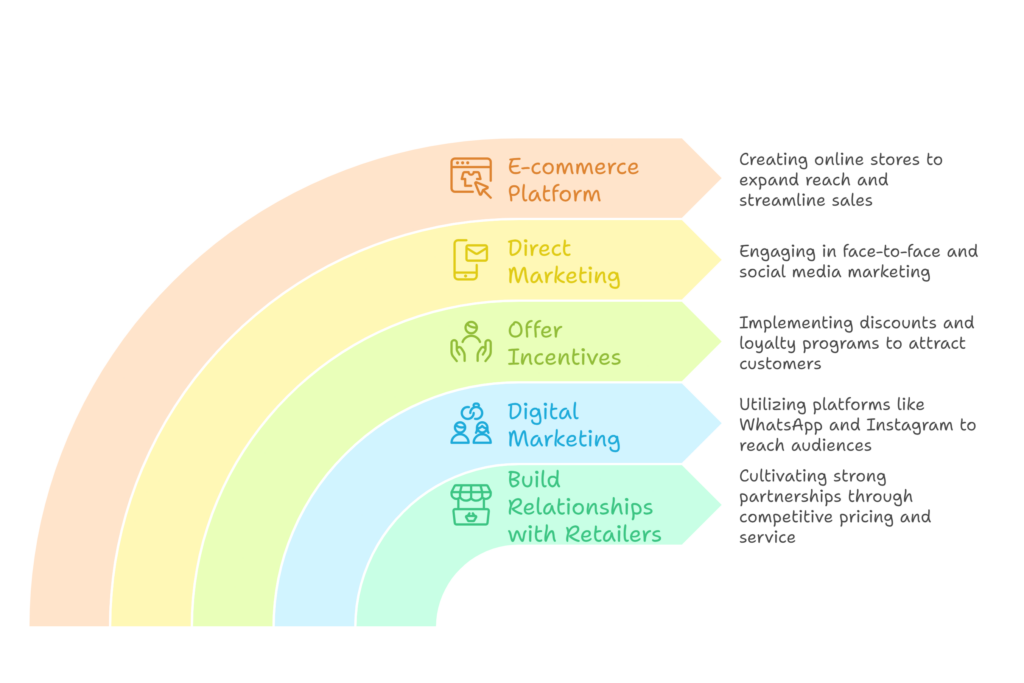
- Build relationships with retailers: Cultivate strong relationships with retailers by offering competitive pricing, flexible payment options, and exceptional customer service.
- Digital marketing: Leverage digital platforms like WhatsApp, Instagram, and Facebook to reach a wider audience and promote your products.
- Offer incentives: Consider implementing discounts, loyalty programs, and targeted advertising to attract and retain customers.
- Direct marketing: Engage in face-to-face marketing and social media marketing to connect with potential customers directly.
- E-commerce platform: Create an online wholesale store using platforms like Shopify to expand your reach and streamline your sales process.
- Optimize inventory and marketing: Efficient inventory management and effective marketing are essential for thriving in the competitive wholesale market.
Final Thoughts
Embarking on a wholesale business in Nigeria can be a fulfilling and profitable venture.
The Nigerian wholesale market is characterized by a high demand for consumer goods, particularly in categories like food, clothing, household items, and electronics.
This demand is driven by factors such as a young and growing population, increasing urbanization, and rising household incomes.
Aspiring wholesalers in Nigeria should capitalize on these trends by carefully selecting their product niche and conducting thorough market research.
Furthermore, building strong relationships with both suppliers and retailers is crucial for long-term success. Reliable suppliers ensure a consistent flow of quality products at competitive prices, while strong relationships with retailers foster customer loyalty and drive sales.
Read also:


